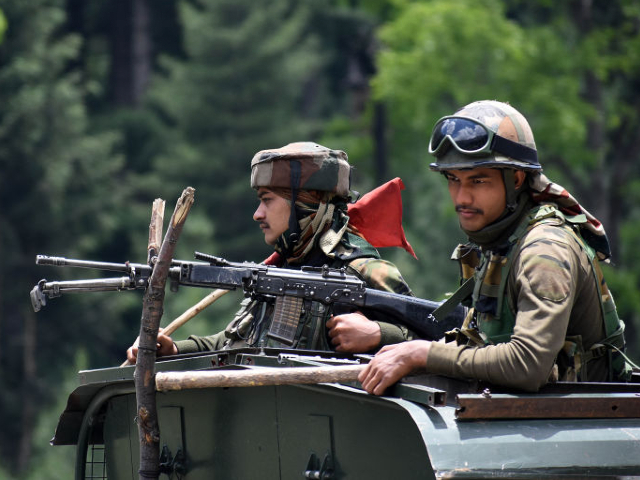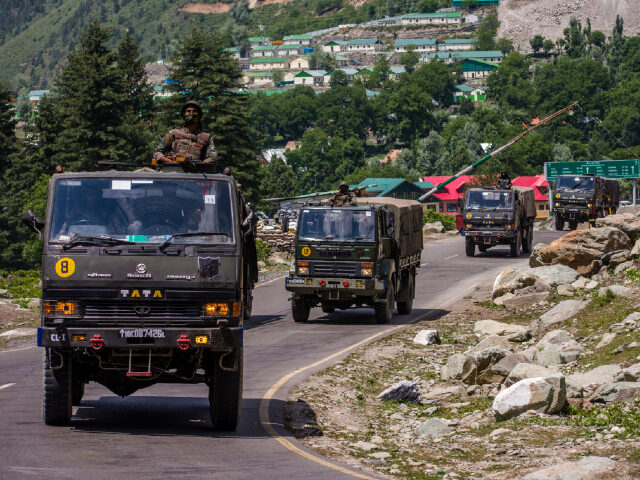Indian External Affairs Minister Subrahmanyam Jaishankar blamed the Chinese Communist Party on Sunday for tensions on the nations’ mutual border that led to a military defeat for Beijing in 2020, claiming China has continued to lack “respect” for agreed-upon limits to mass troop movements in the region.
China and India share a vast border that spans much of the Himalayas. In part due to the steep and difficult terrain in the region, much of the border remains unmarked, prompting decades of disputes in which both sides accuse the other of illegally crossing into their country. In June 2020, a large contingent of Chinese People’s Liberation Army (PLA) soldiers established a tent presence in an area that India claimed was clearly within its borders, prompting Indian soldiers to confront the group about their location. The Chinese soldiers attacked, resulting in the first military battle between India and China in decades. As the rules of engagement on the border prohibited soldiers on both sides from carrying firearms, the soldiers used rocks and sticks to beat each other. Many reportedly fell down cliffs to their deaths or died of hypothermia.
Indian officials said after the incident, which took place in the Galwan Valley of India’s Ladakh region, that twice as many Chinese soldiers died as Indians did in the fighting. The Chinese government refused to acknowledge a single casualty for months before finally claiming to have lost four soldiers in February 2021.

KASHMIR, INDIA-JUNE 17: Indian army soldiers on top of a military vehicle move along the Srinagar-Leh National highway on June 17, 2020.At least 20 Indian soldiers were killed in a violent clash with Chinese forces in a disputed border area. (Photo by Faisal Khan/Anadolu Agency via Getty Images)
In his remarks on Sunday, Jaishankar lamented that diplomacy between China and India had been “very difficult” in the aftermath of the fighting, which led to several other, smaller military disputes on their border.
“We have agreements with China going back to the 1990s which prohibits bringing mass troops in the border area. They have disregarded that,” Jaishankar said on Sunday at an event for the Indian community in Sao Paulo, Brazil. “You know what happened in the Galwan Valley. That problem has not been resolved and that has been clearly casting a shadow.”
“They are our neighbors. Everybody wants to get along with their neighbor. In personal life and country-wise as well. But everybody wants to get along with on reasonable terms. I must respect you. You must respect me,” the top diplomat explained. “So, from our point of view, we have been very clear that we have to build the relationship and there has to be mutual respect. Each one will have their interests and we need to be sensitive to what the concerns are for others for a relationship to be built.”
The Times of India noted that Chinese dictator Xi Jinping and Indian Prime Minister Narendra Modi could possibly meet in person as soon as September, when the Shanghai Cooperation Organization (SCO), a regional trade group, meets in Uzbekistan. The meeting would likely be a contentious one given the context of border concerns, though India and China have maintained cordial ties in other venues, such as the BRICS organization – which brings the two together alongside Brazil, Russia, and South Africa.
Jaishankar is on a tour of Latin America that began in Brazil this weekend and will also take him to Paraguay, which he toured on Monday, and Argentina.
“In Paraguay, EAM [external affairs minister] will also inaugurate the premises of the newly opened Indian Embassy which started functioning in January 2022. This would be the first-ever visit by an Indian External Affairs Minister to the country,” Asian News International noted. “In Brazil and Argentina, EAM will co-chair the Joint Commission Meetings (JCM) with his counterparts. JCMs will review the entire gamut of bilateral relationships in diverse fields and discuss regional and global issues of common interests.”
Began my Latin American visit by meeting the Indian community in Sao Paulo.
Shared with them the progress and optimism as India completes 75 years of Independence. pic.twitter.com/BcjYOBWOBJ
— Dr. S. Jaishankar (@DrSJaishankar) August 21, 2022
The Chinese state propaganda outlet Global Times condemned Jaishankar’s comments on Monday, citing Chinese Communist Party “experts” to make the claim that India was exclusively to blame for any tensions between the two countries.
“From the perspective of maintaining friendly relations, China has not deployed large numbers of military troops in the LAC [Line of Actual Control, the India-China border] area, while in contrast, India has been rapidly expanding its military power along the LAC since the end of the last century,” a regime-approved “expert,” Zhang Yongpan, told the Global Times – making the exact opposite claim to what Jaishankar had said on Sunday.
Zhang predicted that Jaishankar holding China accountable for repeatedly invading India “could undermine the mutual trust and affect the development of bilateral relations” and that India was “obviously” lying about violating border agreements.
While the Galwan Valley battle was the product of Chinese soldiers violating India’s border, India has responded to the incident with its own encroachments, most prominently the takeover of critical mountaintops alongside the Pangong Tso, a lake that straddles India and occupied Tibet, in September 2020. India has also taken symbolic actions meant to irritate the Chinese communists, most recently using the Air Force to fly the Dalai Lama, the head of Tibetan Buddhism, to the Ladakh region for his birthday, an act of support defying China’s decades of attempting to brand the peaceful monk a “terrorist.”
India is also reportedly preparing to hold joint military drills with America in Uttarakhand state, on the border, in October. The October exercises are part of an annual drill that has reportedly been relocated to take place closer to China.
The Global Times paired Zhang’s commentary with the claim that Jaishankar was wrong to brand India-China relations as “difficult.”
“Actually, China and India achieved remarkable results on the border issue … The border area is stable and military and diplomatic channels between the two sides are relatively smooth, Zhang said,” according to the Chinese propaganda outlet.

COMMENTS
Please let us know if you're having issues with commenting.